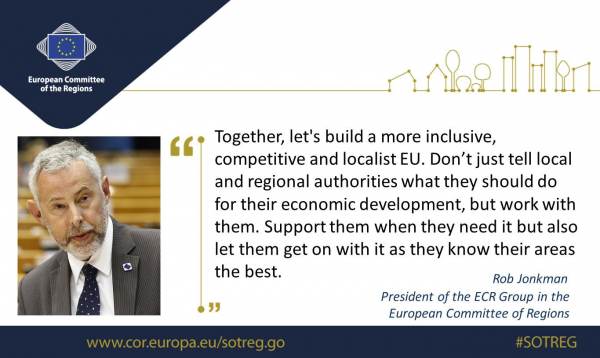ECR President calls for more inclusive, competitive and localist EU

On 9 October 2018 the European Committee of the Regions' plenary session on the "State of the European Union: the View of its Regions and Cities" took place. The session was organised against the backdrop of ongoing political debates on the future of Europe and the upcoming European Parliament elections. Speaking on behalf of the ECR Group, its President Rob Jonkman (Alderman in Opsterland, Netherlands) underlined the fact that "for the EU to succeed, it will need to embrace more inclusive, competitive and localist principles".
Mr Jonkman said that to create this type of Europe, a more collaborative approach was needed in the EU. He explained that "local and regional authorities should not just be told what they should do for their economic development, but that the EU needs to work with them in close partnership". Moreover, he called upon the President of the European Parliament, Mr Antonio Tajani, to "support localities and regions when they need it but also [to] let them get on with it as they know their areas best".
In his address to the CoR plenary, Mr Jonkman stressed that our diversity and our local communities are our greatest strength. He cited the recent ECR Localism Summit as a good example of how different levels of government, the private sector and different parts of the community can work together in search of bottom-up solutions. The Summit was held on 22 October in Milan, Italy. It addressed issues such as access to urban services, social inequalities, climate change, disaster risk management and migration.
Furthermore, the ECR President called upon the EU to rethink its budget and spend its resources on its most immediate priorities while striking a balance so that local and regional authorities do not become dependent on subsidies, instead allowing those that face social, economic and geographical challenges to receive the necessary support

